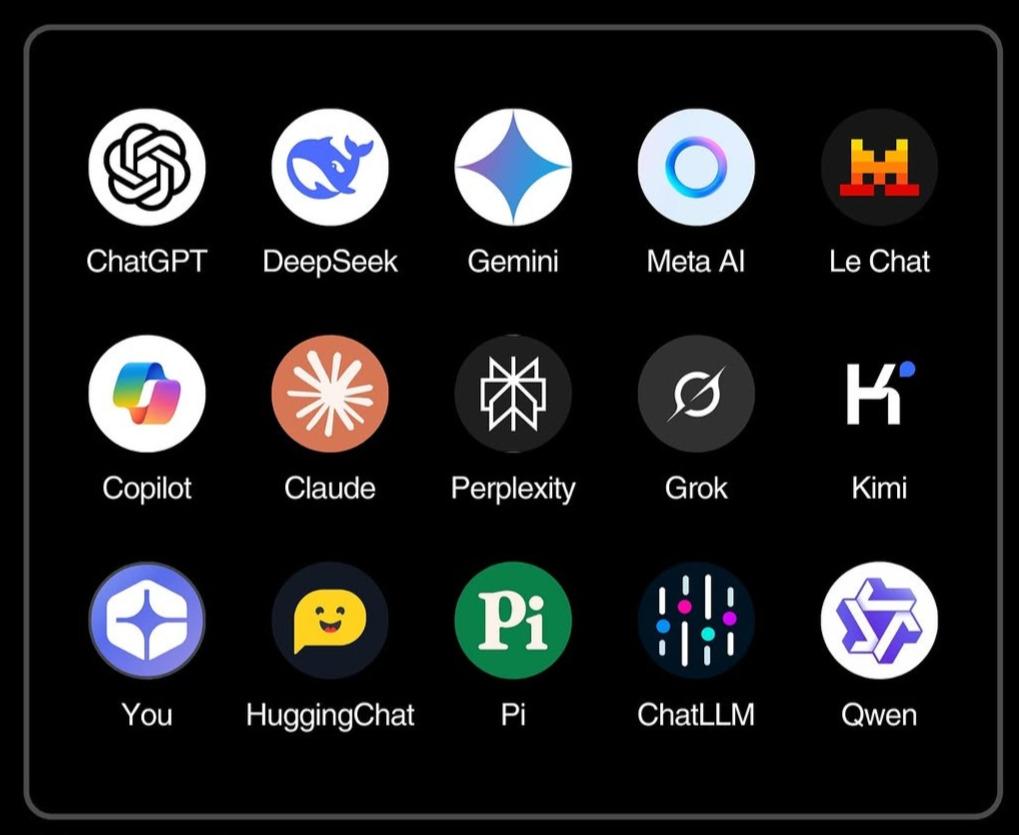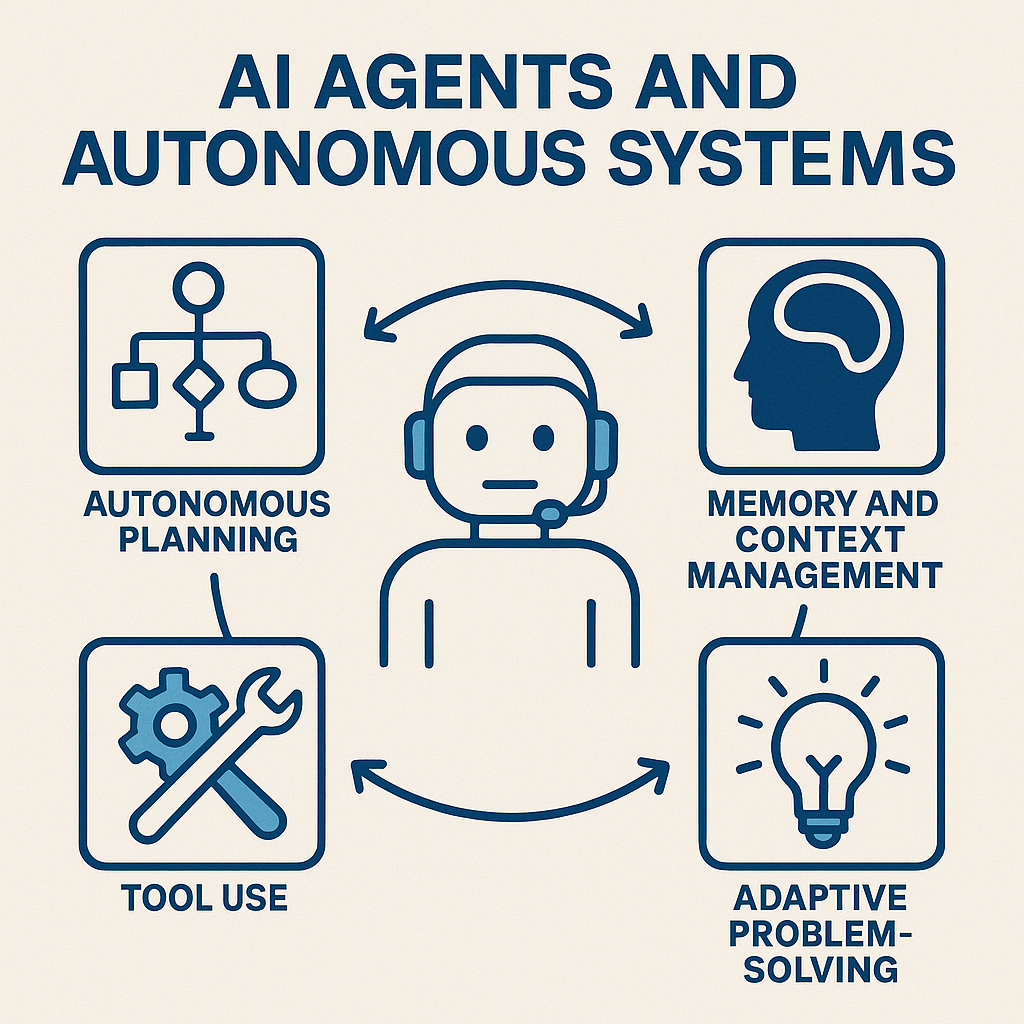The AI Agent Revolution - Commercial and Technological Landscape for Entrepreneurs (and Others)!
posted: 09-Jun-2025 & updated: 10-Jun-2025
For entrepreneurs, this means that competitive advantage no longer comes from having access to the best AI model (since they're increasingly commoditized), but from having the best data architecture and domain-specific knowledge bases.
The question isn't whether AI agents will revolutionize business operations—it's which entrepreneurs will build the companies that lead that revolution.
The Artificial Intelligence (AI) landscape has reached a critical inflection point in (or even before) 2024, marked by two fundamental shifts (among many others) that are reshaping the commercial technology ecosystem. First, foundational AI capabilities have become commoditized, with large language model (LLM) development concentrated among a select few organizations with the requisite capital and infrastructure.1 Second, we have entered the era of agentic AI—a technological maturation that enables autonomous systems to perform complex, multi-step operations with unprecedented sophistication using unprecedented AI technology.
As I emphasize in almost every recent AI lecture of mine, these developments represent more than incremental progress—they signal a fundamental transformation in how we conceptualize and deploy AI in commercial applications. The barrier to entry for developing state-of-the-art foundation models has become prohibitively high, with only companies like OpenAI, Google, Anthropic, Mistral AI, DeepSeek, Alibaba, X, and Perplexity possessing the necessary resources. This reality has profound implications for entrepreneurs and investors seeking to build sustainable businesses in the AI space.

Before delving into AI agents, let’s examine how AI evolved during the 21st century by observing key technological milestones. Around 2010, the industry began focusing intensively on Big Data analytics and storage solutions. In 2012, AlexNet catalyzed the deep learning revolution, demonstrating that neural networks could achieve superhuman performance in image recognition tasks. The 2017 introduction of the Transformer architecture laid the groundwork for modern language models, culminating in ChatGPT’s mainstream debut in 2022. This progression naturally evolved into widespread adoption of large language models (LLMs) and generative AI (genAI) technologies. Then finally, by late 2024, the focus shifted to AI agents—autonomous systems capable of executing complex, multi-step workflows with minimal human supervision.
The concept of agents has traditionally been associated with robotics and autonomous systems. However, the current generation of AI agents represents something fundamentally different: software entities that can reason, plan, and execute tasks across digital environments with human-level or superior performance in specific domains.2
(While I won’t delve extensively into emerging protocols like model context protocol (MCP) or agent-to-agent (A2A) communication—these represent important but potentially transient technical implementations—I do want to emphasize technologies like retrieval-augmented generation (RAG) that represent fundamental architectural patterns. RAG’s significance lies not in its specific implementation but in its role as a bridge between general AI capabilities and domain-specific knowledge, maximizing the utility of large language models through contextual information retrieval.)
Now let’s examine the commercial opportunities and practical applications that entrepreneurs can pursue with AI agent technologies.
The Fundamental Shift – From Tools to Autonomous Actors
The transition from traditional AI tools to AI agents represents a paradigm shift comparable to moving from calculators to computers, or from static websites to interactive applications; actually, it’s more than these! Where previous AI implementations required constant human oversight and explicit instructions for each task, AI agents can now operate with remarkable autonomy, making decisions, executing complex workflows, and even learning from their interactions.

This autonomy is what makes AI agents revolutionary for entrepreneurs. Instead of building AI features that enhance existing products, entrepreneurs can now create AI-powered entities that can independently handle entire business processes. Think of the difference between a spell-checker (AI tools) and a personal assistant who can research, write, edit, and publish content based on high-level objectives (AI agents).
The RAG Foundation – Why Data Architecture Matters More Than Model Selection
As I’ve emphasized in my work, RAG isn’t just another technical acronym—it’s the fundamental bridge between generic AI capabilities and specific business value. For entrepreneurs, this means that competitive advantage no longer comes from having access to the best AI model (since they’re increasingly commoditized), but from having the best data architecture and domain-specific knowledge bases.
Consider a legal tech startup: while every competitor can access the same LLMs, the company that builds the most comprehensive, well-structured legal knowledge base with effective RAG implementation will deliver superior results. The AI agent becomes exponentially more valuable when it can access and reason over decades of case law, regulatory changes, and firm-specific precedents.3
This principle extends across industries. In healthcare, financial services, manufacturing, or retail, the winning AI agents will be those that can seamlessly integrate domain expertise through well-architected RAG systems. For entrepreneurs, this means the moat isn’t in the AI model—it’s in the quality and organization of your data ecosystem.
Commercial Applications – The Explosion of Possibilities
The commercial applications of AI agents are staggering in their breadth and depth. Let me walk through the major categories that entrepreneurs should consider:
Customer Service and Support Revolution
AI agents are transforming customer service from reactive ticket-handling to proactive relationship management. Modern AI agents can handle complex multi-turn conversations, access customer history, integrate with multiple systems, and even escalate issues to human agents with full context. Companies like Intercom and Zendesk are already seeing AI agents resolve 80%+ of customer inquiries without human intervention.
But the real opportunity lies in going beyond traditional support. AI agents can now manage entire customer lifecycles—from initial lead qualification through onboarding, ongoing success management, and retention efforts. They can analyze customer behavior patterns, predict churn risk, and proactively engage with personalized interventions.
Sales and Marketing Automation
The sales funnel is being completely reimagined through AI agents. These systems can now conduct sophisticated lead qualification, handle complex B2B sales conversations, and even negotiate terms within predefined parameters. More importantly, they can operate 24/7 across multiple channels simultaneously, scaling sales operations in ways previously impossible.
Marketing AI agents are evolving beyond simple email automation to become comprehensive campaign orchestrators. They can analyze market trends, create personalized content at scale, manage multi-channel campaigns, and continuously optimize performance based on real-time feedback. The result is marketing that’s both more personal and more scalable than traditional approaches.
Content Creation and Creative Industries
The creative economy is experiencing a fundamental transformation. AI agents can now handle end-to-end content production workflows—from research and ideation through creation, editing, and distribution. This isn’t just about generating text or images; it’s about creating comprehensive content strategies that adapt in real-time to audience engagement and market dynamics.
For entrepreneurs, this opens opportunities in personalized content creation, automated journalism, educational content development, and even entertainment production. AI agents can create interactive narratives, personalized learning experiences, and dynamic content that adapts to individual user preferences and behaviors.
Financial Services and Fintech
Financial services represent one of the most promising areas for AI agent deployment. These systems can handle complex financial analysis, provide personalized investment advice, manage portfolio optimization, and even execute trades based on sophisticated market analysis. The combination of financial expertise embedded in RAG systems with real-time market data creates unprecedented opportunities for automated financial management.
Beyond traditional finance, AI agents are enabling new models of financial inclusion, automated compliance monitoring, fraud detection, and risk assessment. For fintech entrepreneurs, the opportunity lies in creating AI agents that can democratize sophisticated financial services that were previously available only to high-net-worth individuals or large institutions.
Healthcare and Biotech Applications
Healthcare presents enormous opportunities for AI agents, particularly in areas where human expertise is scarce or where continuous monitoring is required. AI agents can handle patient intake, symptom assessment, medication management, and follow-up care. They can also support healthcare providers by automating documentation, analyzing medical literature, and providing clinical decision support.
In biotech, AI agents are accelerating drug discovery, clinical trial management, and regulatory compliance. They can analyze vast amounts of research data, identify potential drug targets, and even design clinical trial protocols. The combination of domain expertise through RAG with real-time research capabilities creates opportunities for breakthrough innovations in medical science.
Manufacturing and Industrial Applications
The industrial sector is seeing AI agents transform everything from supply chain management to quality control. These systems can optimize production schedules, predict equipment failures, manage inventory levels, and coordinate complex logistics operations. They can also handle supplier relationships, negotiate contracts, and manage compliance across multiple regulatory frameworks.
For manufacturing entrepreneurs, AI agents enable new business models around predictive maintenance, automated quality assurance, and dynamic supply chain optimization. The ability to create AI agents that understand specific industrial processes and can operate autonomously in manufacturing environments opens opportunities for significant productivity gains and cost reductions.
The Integration Challenge – Making AI Agents Enterprise-Ready
For AI agents to deliver real business value, they need to integrate seamlessly with existing enterprise systems. This creates opportunities for entrepreneurs who can solve the complex integration challenges that enterprises face when deploying AI agents.
The most successful AI agent companies will be those that can provide turnkey solutions that work with existing CRM systems, ERP platforms, communication tools, and data warehouses. This requires not just technical integration capabilities, but deep understanding of enterprise workflows and change management processes.
Security, compliance, and governance also become critical considerations. AI agents that handle sensitive business processes need robust security frameworks, audit trails, and compliance monitoring. Entrepreneurs who can build AI agents that meet enterprise security and compliance requirements will have significant competitive advantages.
The Network Effect – AI Agents That Get Smarter Together
One of the most exciting aspects of AI agents is their potential for network effects. Unlike traditional software that operates in isolation, AI agents can learn from each other’s experiences and share knowledge across deployments. This creates opportunities for AI agent platforms that become more valuable as more users adopt them.
For example, an AI agent that handles customer service for e-commerce companies can learn from interactions across multiple clients, improving its capabilities for all users. Similarly, AI agents in financial services can share insights about market patterns and risk factors while maintaining appropriate privacy and security boundaries.
Entrepreneurs who can design AI agent systems with strong network effects will build businesses with natural monopoly characteristics and increasing returns to scale.
Vertical-Specific Opportunities – The Power of Domain Expertise
While horizontal AI agent platforms will capture significant value, some of the most lucrative opportunities lie in building AI agents for specific verticals. Industries with complex regulatory requirements, specialized knowledge bases, and established workflows present opportunities for AI agents that can deliver immediate, measurable value.
Legal tech, healthcare, financial services, real estate, and professional services all represent verticals where domain-specific AI agents can command premium pricing and build strong customer relationships. The key is combining deep industry expertise with sophisticated AI agent capabilities.
For entrepreneurs with domain expertise in specific industries, this represents a significant opportunity to build AI agents that solve real problems for professionals who understand the value of specialized knowledge and are willing to pay for solutions that demonstrably improve their outcomes.
The Human-AI Collaboration Model
The most successful AI agent implementations won’t replace humans entirely, but will create new models of human-AI collaboration. This opens opportunities for entrepreneurs to build AI agents that augment human capabilities rather than replacing them entirely.
Consider how AI agents can handle routine tasks while escalating complex decisions to humans, or how they can provide real-time insights and recommendations to support human decision-making. The companies that can design effective human-AI collaboration models will build more sustainable businesses and face less resistance to adoption.
This collaboration model also creates opportunities for new types of jobs and business models. As AI agents handle more routine tasks, humans can focus on higher-value activities that require creativity, emotional intelligence, and complex reasoning. Entrepreneurs who can design business models that leverage this shift will create significant value for both their customers and their employees.
The Investment Landscape – Capital Requirements and Return Profiles
The investment dynamics for AI agent companies differ significantly from traditional software businesses. While foundation model development requires massive capital expenditure, AI agent companies can achieve substantial scale with relatively modest initial investments. This creates opportunities for a broader range of investors and entrepreneurs to participate in the AI revolution.
The key investment considerations include data acquisition and curation costs, talent acquisition in a competitive market, and the iterative development cycles required to achieve product-market fit. However, successful AI agent companies can achieve rapid revenue growth and high gross margins once they establish effective market positions.
For investors, AI agent companies offer attractive risk-return profiles compared to foundation model development, while still providing exposure to the transformative potential of artificial intelligence. The distributed nature of AI agent opportunities means that successful companies can emerge across multiple verticals and geographies.
Regulatory Considerations and Market Dynamics
The regulatory environment for AI agents is still evolving, creating both opportunities and challenges for entrepreneurs. Early movers who can establish best practices for responsible AI agent deployment will likely influence regulatory frameworks and gain competitive advantages through compliance expertise.
Key regulatory considerations include data privacy, algorithmic bias, liability for autonomous decisions, and professional licensing requirements in regulated industries. Entrepreneurs who proactively address these concerns through thoughtful product design and governance frameworks will build more sustainable businesses.
The global nature of AI agent applications also creates opportunities for regulatory arbitrage, where companies can deploy solutions in markets with favorable regulatory environments while building expertise that can be applied as regulations evolve in other jurisdictions.
Looking Forward – The Entrepreneurial Imperative
As we stand at the beginning of the AI agent revolution, entrepreneurs face both an enormous opportunity and a critical timing window. The companies that can successfully build and deploy AI agents in the next few years will establish significant competitive advantages that will be difficult to replicate. The combination of commoditized foundation models, sophisticated RAG architectures, and improving AI agent frameworks creates a perfect storm of opportunity for entrepreneurs who can identify specific market needs and build solutions that deliver real value.
The future belongs to entrepreneurs who can envision how AI agents will transform their industries and build the companies that make that transformation a reality. The question isn’t whether AI agents will revolutionize business operations—it’s which entrepreneurs will build the companies that lead that revolution.
For those ready to embrace this opportunity, the AI agent revolution represents the most significant entrepreneurial opportunity since the advent of the internet itself. The convergence of technological capability, market demand, and accessible development platforms creates conditions where innovative entrepreneurs can build transformative businesses that reshape entire industries.
- That is, those companies such as OpenAI, Anthropic, Google, Amazon, X, Mistral AI, Liquid AI, Perplexity, DeepSeek, Alibaba, etc. ↩
- Strictly (or rather exactly) speaking, AI cannot reason or think, nor can it believe or know something. Here when I say it reasons, I (wrongly) adopt what most people say for their better understanding! Refer to one of my articles, (WIP) AI (with current ML/DL architecture) does not believe nor reason nor know nor think!. ↩
- Again (carefully) refer to (WIP) AI (with current ML/DL architecture) does not believe nor reason nor know nor think!. ↩
